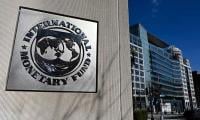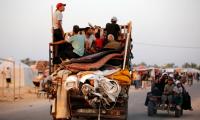ISLAMABAD: In the face of a ballooning balance of payments crisis, with the rupee having lost a third of its value and inflation at a five-year high, Pakistan’s military agreed this month to a rare freeze of its hefty budget to help ease the South Asian nation’s slowing economy, Arab News reported on Thursday.
The “critical financial situation,” according to military officials, senior government officers and experts, has also convinced the army that the time to watch the economic downturn from the sidelines is over.
On Tuesday, the government announced a high-powered National Development Council (NDC) that will set the country’s long-term economic policy, and of which the all-powerful army chief, General Qamar Javed Bajwa, will be a member. Both officials and analysts see the move as one of the military’s boldest forays into civilian life in recent years.
In Pakistan, power has changed hands more often through coups than elections and civilian governments have traditionally been subservient to generals on issues of national security — from the fight against Taliban insurgents to ties with arch-rivals India and Afghanistan.
But this is the first time the military has been given a formal seat at the economic table.
With a military expenditure of $11.4 billion in 2018, both government and military officials say the army’s worries about a worsening economic outlook are fair. But analysts also warn that the government will only emerge weakened from a decision to give yet more power to arguably the most powerful institution in Pakistan.
A cabinet member with knowledge of the new council’s formation said being a part of the body would allow the army chief to have a greater say in “the discharge of executive powers.” He declined to be named due to the sensitivity of discussing the inner workings of the military.
Clearly, the military thinks that it [government] is struggling with the day to day running [of the economy] and so they are saying, “we can give our input” the official said.
Less than a year ago, Imran Khan swept to power in a milestone poll that marked only Pakistan’s second transition from one elected government to another, no one could have foreseen he would be in so much trouble.
But a crumbling economy in the last many months has seen Prime Minister Khan forced into an International Monetary Fund bailout and running to the military for cover, experts say.
Revenue Minister Hammad Azhar rejected this notion, saying the purpose of the new council was simply to create consensus among all stakeholders.
“It’s not really in the country’s interests that separate wings of the government, whether it’s the executive, the cabinet, Parliament or the military … if they’re not on one page, they’re undercutting one another or playing games with one another,” Azhar said in an interview with Arab News on Tuesday evening.
At the end of the day, the prime minister would be “the final decision-maker” in the council, he said, adding that it was illogical to conclude that military coups in the past meant the government should now “exclude the military from all spheres of the consultative process.”
“Whether anyone likes it or not, the Pakistani military has a huge claim on Pakistan’s budget … So naturally they [army] are directly affected by economic issues,” Azhar said.
The Pakistani army has for years been fighting Taliban insurgents holed up in the country’s northwestern tribal regions bordering Afghanistan and shocking the nuclear-armed state with their ability to launch attacks on both civilian and military targets. Though security has improved in recent years, militants still carry out sporadic assaults.
Pakistan also has tense relations with neighboring India to the east and Afghanistan to the west. It has fought three wars with India since independence from the British in 1947, and early this year, the two countries launched aerial strikes on each other and fought a brief dogfight over Kashmir skies.
“Given the security situation and our geostrategic position, it is also vital that we [government] solicit input from them [army] and give them our input,” Azhar said.
The army’s media wing declined official comment for this article but one military official close to the discussions said the army had “real stakes” in the economy and a right to provide input.
“With this body we can do it in an above-board way,” he said. “We will give recommendations and it is on the government, on cabinet, as and when they accept them.”
The exact mandate and powers of the body are as yet unclear, experts and officials said.
Two of the broad terms of reference mentioned in the statement announcing the new council relate to regional connectivity and cooperation, suggesting that the army will now have an outs ized role in the planning and implementation of international projects.
These include a $60 billion China-Pakistan Economic Corridor of energy and infrastructure projects, free-trade agreements and transnational pipeline deals with various countries, and loan and aid agreements with friendly nations like Saudi Arabia and the United Arab Emirates.
The appearance of the word “approve” in the terms of reference has also raised questions over whether the council has powers over and above the cabinet, usually the final authority on policy matters.
This month, Pakistan proposed a belt-tightening budget to tame its fiscal deficit, targeting federal tax revenues of 5.55 trillion rupees ($36.80 billion) and setting austerity measures for both civilian and military rulers.
The cabinet member with knowledge of the NDC’s establishment said the body was initially conceived merely as a discussion forum but it’s “exact role will evolve over the coming weeks and months … how exactly and to what extent it can approve decisions.”
Mohammad Malick, a political anchor, said it was unclear how often the body would meet and at what level it would become involved in economic decision-making.
“At the planning stage? Before a matter goes to the cabinet?” he asked. “If the body’s role comes after the cabinet, then it becomes a supra-body and that will create complications because constitutionally, ultimate authority vests with the cabinet.”
Whatever the exact terms of the new council, opposition politicians said its formation was evidence that the military was convinced the civilian government was not up to the economic task.
“To me the military’s inclusion [in the NDC] is more of a reflection on the civilian govt and its performance, that it needs to have the army chief come in and create some discipline and consistency in economic policy,” Miftah Ismail, Pakistan’s finance minister in the previous government, said.
“The feeling is that this is beyond the government’s experience and competence and so they need an adult in the room.”
Ultimately, officials said, the purpose of the new council was “power sharing.”
“This is about sharing power and also sharing responsibility,” the cabinet member said. “Now the economy isn’t just the government’s problem. The army will also have to answer.”
College administration is required to appear in person to explain the details of the incident and any actions taken to...
Court observed that the TCP termed it a “shortage”, whereas the Punjab trading agency claims that a substantial...
Anti-Terrorism Special Court Judge Malik Ijaz Asif also announced 32 years in jail and a fine of Rs0.5 million for the...
Two-day conference at the King Abdullah Campus of UAJK aims to chart a course towards sustainable economic growth and...
In Hub, environmental sample was collected on April 17, 2024 from the ‘Jumma Khan Bazar Pul’ environmental sample...
President highlighted that Pakistan was committed to regional connectivity, and the Central Asian countries needed to...







